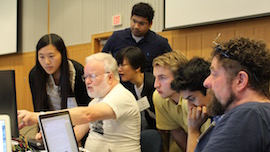Teams Innovate, Create At Ann Arbor Health Hackathon
Wednesday, June 29, 2016
A kid-friendly mobile app giving children the power to participate in research studies to improve their health won first place at the inaugural Ann Arbor Health Hackathon: Prototyping Disease Prevention, co-sponsored WDI.

The round-the-clock event, held June 24-26 on the University of Michigan campus, drew 91 participants who formed 18 teams comprised of students, researchers, and professionals from the biomedical, engineering, IT, business, clinical, design, and public health sectors. Hackathon judges awarded prizes for first, second and third places, as well as a Cardiovascular Prize. Participants voted on a People’s Choice Prize. Teams were assisted by more than 40 mentors who wandered the room, listened to the groups and provided feedback.
The second-place team created a virtual reality app to help patients suffering from post-traumatic stress disorder, while the third-place team developed a personalized, real-time motion capture application to improve physical therapy. The Cardiovascular Prize went to a team that developed an easy-to-understand, paper-based test to signal onset of atherosclerosis – the buildup of fats, cholesterol and other substances on the artery walls. Finally, the People’s Choice Prize went to a team that worked to connect transportation and grocery stores to increase access to nutritious food.
All winners were given incubation space at Ann Arbor SPARK, the local economic development organization, to further develop their ideas. In addition, the top winners received partial scholarships from SPARK for its Entrepreneur Boot Camp and $500 from WDI to cover additional costs for the camp. Winners also were awarded customer discovery services from The SearchLite, an Ann Arbor company that helps entrepreneurs commercialize their invention or startup. There also were cash prizes.
“The hackathon achieved the two goals we set for it: develop some innovative solutions to real challenges in healthcare and bring together the Ann Arbor community,” said Brittany Johnson, a global health supply chain consultant and organizer of the event.
Another hackathon organizer, Diane Bouis, said it fostered medical innovation and the local medical startup ecosystem.
“We wanted to get the brightest people in the room and enable them to make incredible things happen,” said Bouis, director of innovation programs at The Inovo Group, a strategic innovation consultancy in Ann Arbor. “And I can truly say that we are humbled by what we saw.”
A networking event Friday evening kicked off the weekend, with the hackathon starting Saturday morning. Participants worked through the night until noon Sunday, then presented their projects to a panel of judges.
“The best part of this event was seeing all the brain power mesh in the room,” said WDI Healthcare Research Associate Beatrix Balogh, one of the event organizers.
“Seeing the results of ideas are great, but you see it in a completely different light when you spend the entire weekend watching people work together. They throw out ideas, find other folks who share those same interests to form a team, really hone in on how to best develop out that idea, and just take off.”
Balogh said another success was the diversity amongst the teams with participants coming from various fields of study and a good mix of students and professionals.
“The number one thing that made me so incredibly happy is that 50 percent of the A2 Health Hackers were women,” Balogh said. “I’ve been to so many hackathons where the majority of participants are guys, so it was such a relief to see so many women at our event.”
Neelima Ramaraju, director of global health initiatives at Ann Arbor’s LLamasoft, a supply chain design firm, and a hackathon organizer said the event’s energy was “electric, positive, and contagious.”
“We are excited to follow the winning teams and see the impact they will have on the world,” she said.
Round-the-clock hackathons are more commonly associated with software developers and computer programmers building new tech gadgets. But health-themed hackathons are increasing in popularity as those interested in the healthcare field explore new ways to innovate and create new technologies and processes.
“We received a lot of encouragement to make this an annual event, and the great energy from this weekend has motivated us to start planning for 2017,” Johnson said.
Partners for the event were The Inovo Group, HealthDesignBy.Us and Gamestart. In addition to WDI, other hackathon sponsors were: LLamasoft, SPARK, The SearchLite, U-M Institute for Healthcare Policy & Innovation, Oakland County Economic Development and Community Affairs, The SearchLite, Frankel Cardiovascular Center, St. Joseph Mercy Health System and Arboretum Ventures.
